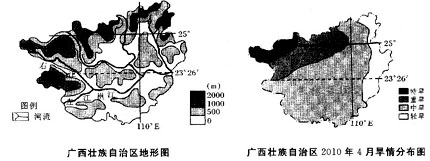结合图文材料,回答问题。

(1)左上图中右江的流向为(),判断的依据是()。
(2)广西河流径流量的季节变化有何特点请简述其原因。
广西于2009年8月至2010年4月发生了旱灾。旱情分布见右上图。
(3)据图描述广西旱情的空间分布特点,并请列举两项影响广西旱情分布的自然原因。
红树林是一种枝繁叶茂、根系发达的海岸植被,林中栖息着多种鸟类。广西红树林分布区被列为国家级自然保护区。目前,该保护区的红树林正作为旅游资源被适度开发。
(4)有红树林分布的沿岸地区,遭受特大风浪袭击后,经济损失较小,红树林所起的作用是()。
(5)保护区管理部门在红树林景区为游客提供望远镜,或修建浮桥(见上图)。请从旅游景区三要素来简要评价这种做法。
参考答案:
(1)自西北流向东南 右江所在区域地势自西北向东南降低
(2)特点:季节变化大,夏季径流量大,冬季径流量小。
原因:受东南季风影响,该区夏季降水多,冬季降水少。
(3)分布特点:旱情自东向西逐渐加重。
原因:东部降水多,西部降水少;西部海拔高,坡度大,地表水难以保存;西部是喀斯特地貌,石灰岩广布,地表水易渗漏;西部土层稀薄,难以保持水分。
(4)海岸边的红树林能够减小海浪的侵袭,巩固堤岸,在一定程度上起到阻挡海浪侵蚀海岸,保持当地生物的多样性的作用。
(5)旅游景区的三要素是旅游者、景点和景区服务业。对于旅游者来说,望远镜和浮桥能让他们近距离地游玩、欣赏风景,也能减少人类活动对自然环境和生态的影响和破坏,维持景区生物的多样性。但是一旦游客数量过多,或者浮桥质量欠缺,也可能给游客带来人身安全。对于当地景区和景区服务业来说,提供望远镜和修建浮桥的做法能吸引更多的游客,能够从一定程度上促进景区和景区服务业的经济发展,但这只是权宜之计。保护生态环境的更根本方法是提高人们的环保意识,维持生态自然,尽量减少人类活动对大自然的影响和破坏。
